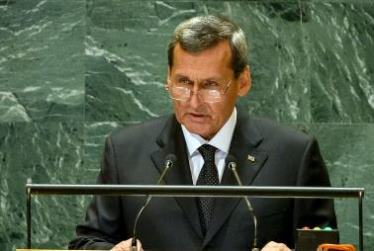Turkmenistan’s Foreign Minister Rashid Meredov addressed the 79th session of the UN General Assembly, outlining four key priorities for his country: peace and security, sustainable development, climate change and humanitarian issues.
Statement summary
RASHID MEREDOV, Deputy Chairman of the Cabinet of Ministers and Minister for Foreign Affairs of Turkmenistan, spotlighted his country’s efforts to promote a “model of neutrality” within the United Nations, recalling that 2025 will mark the thirtieth anniversary of a General Assembly resolution recognizing Turkmenistan’s neutral status. Stating that “the time has come to reflect on the significance of neutrality for global politics, and its potential in the current strategic landscape”, he proposed an initiative to accord neutral countries “priority partnership” with the United Nations in its peacekeeping efforts. Additionally, he spotlighted his country’s Assembly resolution declaring 2025 as the “International Year of Peace and Trust”, stating that Turkmenistan will “take the leading role in organizing relevant events”. Nevertheless, it will rely on the support of all Member States and the Secretariat to ensure that the year becomes “a manifestation of the goodwill of the international community”.
Turning to Afghanistan, he underlined the importance of supporting the Afghan people’s aspirations to “begin peaceful, constructive work to rebuild the economic and social spheres”. For its part, Turkmenistan — together with international partners — is implementing several major infrastructure projects in the country, including the construction of a “strategic Turkmenistan-Afghanistan-Pakistan-India gas pipeline”. Others will see the construction of power-transmission and fibre-optic communication lines along the Turkmenistan-Afghanistan-Pakistan route, as well as a new railway from Turkmenistan to Afghanistan. He also emphasized that his country’s humanitarian aid to the Afghan people will continue, including building social facilities and educating Afghan students in Turkmenistan’s educational institutions. Turkmenistan, he went on to say, will additionally focus on protecting the environment in Central Asia and the Caspian Sea region.
In that context, he urged more active, extensive UN involvement in “saving the Aral Sea”. Also pointing to Central Asia’s struggle with desertification and reduced water resources, he said these challenges requires the “presence of [UN] resident offices in the region on a permanent basis”. He added that “Turkmenistan is ready to work on this”, proposing the establishment of a specialized regional centre for climate-related technologies. And, emphasizing that preserving the Caspian Sea as a “unique natural complex” is not just an internal affair for littoral States — but a global problem — he urged systematic, targeted cooperation with Caspian States to combat the ecological and climate issues affecting the Sea. While noting that the approaching eightieth anniversary of the UN should be a time for reflection, assessment and correction, he underscored that commitment to UN values, principles and goals must remain “unshakeable” — “because they have proven their viability and alignment with the fundamental long-term interests of humanity”. [UN]
Complete statement
https://gadebate.un.org/sites/default/files/gastatements/79/tm_en.pdf
* * *
The Minister noted that Turkmenistan adheres to the principles of the UN Charter, which include respect for sovereignty, equality and mutual respect.
Neutrality and peace
Meredov emphasized that in 2025 the country will celebrate the 30th anniversary of the recognition of Turkmenistan’s neutral status by the UN General Assembly.
He called for neutral countries to be granted the status of “priority partners” in UN peacekeeping efforts. The minister particularly noted Turkmenistan’s leadership in preparation for 2025, which has been declared the International Year of Peace and Trust.
Solidarity with Afghanistan
Meredov emphasized Turkmenistan’s role in supporting reconstruction efforts in Afghanistan. He mentioned major infrastructure projects such as the Turkmenistan-Afghanistan-Pakistan-India gas pipeline, as well as the construction of power lines, fiber-optic networks, and railways.
In addition, the Foreign Minister noted the assistance his country provides to Afghanistan, including the construction of social facilities and the education of Afghan students in Turkmenistan.
Sustainable Development Goals
Meredov called on the international community to support a number of Turkmenistan’s initiatives. Among them are proposals to create a Global Framework Program for the Transition to a Circular Economy, a Global Atlas of Sustainable Transport Connectivity, and an Alliance for Global Energy Security and Sustainable Development.
The Minister emphasized Turkmenistan’s commitment to overcoming humanitarian crises, protecting motherhood and children, and ensuring the rights of refugees and stateless persons. In particular, he noted that the country recently granted citizenship to more than 32,000 refugees and stateless persons, fulfilling previously set goals.
Environmental protection
Meredov called for more active UN involvement in saving the Aral Sea and noted Turkmenistan’s recent initiatives, including the creation of the UN Special Programme for the Aral Sea Basin.
He also called for comprehensive measures to address desertification and water resources management in the region.
The Caspian Sea, according to Meredov, is another serious environmental problem. He emphasized the need for global cooperation to protect the unique ecosystem of the Caspian Sea, proposing the Caspian Environmental Initiative as a platform for dialogue with international partners.
Global challenges
Meredov concluded his speech by stating that he believes in the “enormous creative potential” of the UN and its role in ensuring peace, security and sustainable development.
“Turkmenistan will continue to contribute to solving global challenges for the sake of the future of the world,” he said. [UN News, 27 September] — /// nCa, 30 September 2024
